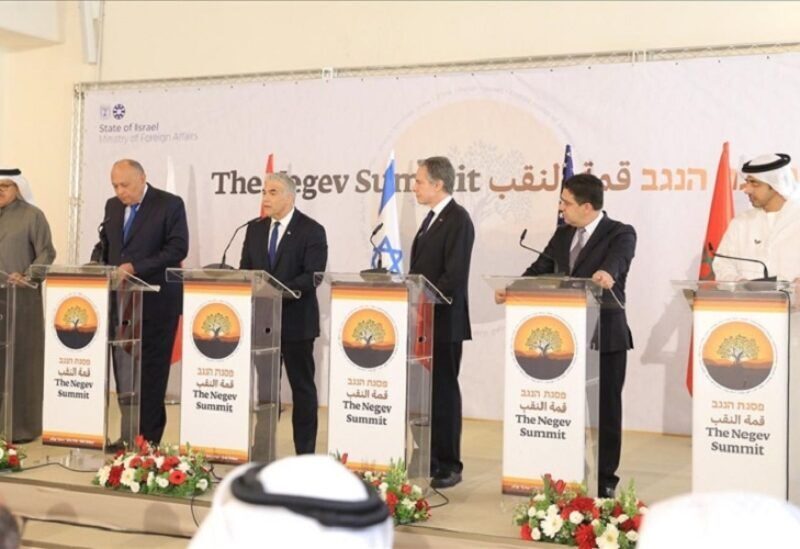
Foreign Ministers of six countries in Negev summit
A new global map has begun to loom on the horizon by recording remarkable international and regional movements even before the conclusion of the Iranian nuclear agreement and the end of the Russian-Ukrainian war.
The historic summit has convened in the Negev yesterday bringing together Arab, Israeli and American officials for the first time in the presence of foreign ministers of the United States, United Arab Emirates, Egypt, Bahrain, Morocco and Israel. The summit dealt with negotiations to revive the nuclear agreement with Iran and the consequences of the Russian invasion of Ukraine.
In this context, a senior diplomatic political source said to “Sawt Beirut International”: “It is certain that the world is moving in a new direction, but it is too early to predict the new alliances, and whether they will adopt the status of permanence and continuity, or will they be mere, circumstantial moves governed by certain accounts.”
The source called for waiting for the next stage, because the whole world is changing, not just the Middle East. He believes that after the conflicting policy of the poles began to record a retreat in favor of shifting alliances in the regions, the world returned to be two superpowers, the United States and its allies on the one hand, and Russia and its allies on the other.
The source regret the vacuum that the Arab world suffers from due to the absence of a regional order and Arab joint action. He pointed out that Gulf countries are afraid that the United States would abandon it, so they opened up to Russia and established an alliance with Israel to protect themselves from Iran. This what the United Arab Emirates did for the first time, as it did not even vote against Russia in the Security Council.
The source indicated that there is no stable alliance at this stage, but in parallel an Arab openness to Iran is recorded, which means that if an agreement is reached in Vienna, it is possible that the rivalry with the Gulf states will disappear, so the current policy is circumstantial dominated by tactics, more than strategy.
Regarding the impact of what is happening internationally and regionally on the Lebanese situation, the source pointed out that the problems that Lebanon is floundering in have become so great that it is preoccupied with itself and is always affected by the worst, especially amid the Arab abandonment of it. We are witnessing sympathy by the Arab League and some countries such as Egypt and Jordan, as for the Gulf states, the return of relations to normal requires time, and the contacts have not yet matured.
The source said: “The question is, if an agreement is reached in Vienna and a real Saudi-Iranian rapprochement takes place, will Iran’s interference in the region ease or develop? Especially since in the year 2015 and following the progress recorded in the nuclear agreement, it was expected that Iranian policy would be more moderate and responsible in the region.”
However, this matter has not happened since that date under the pretext that former US President Donald Trump practiced during his tenure maximum pressure. Therefore, Iran considered itself in a defensive position in Yemen, Iraq and Syria, knowing that the argument became weak.”
The source pointed out that any changes in the region to stabilize and sustain will need time to reflect on Lebanon, especially that Iran is a major regional power and has an active role in the region. As for Russia, it is a non-regional country, but it was considered influential and currently it is busy with its war, but it is certain that it has had good relations with some Arab countries.
Finally, we have to wait and see what the coming days will bring if the nuclear agreement is signed, and how its repercussions and solutions will be reflected on the world and the region in general and Lebanon in particular.